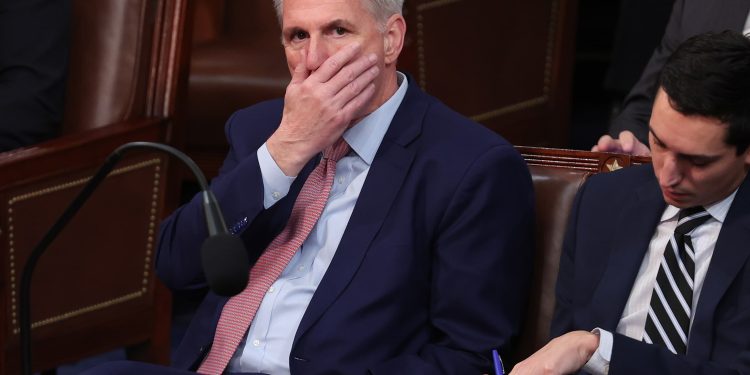For a long third day, divided Republicans left the speaker’s chair of the U.S. House sitting empty Thursday, as party leader Kevin McCarthy failed and failed again in a string of ballots to win enough GOP votes to seize the position.
Pressure was building as McCarthy lost a seventh, eighth and historic ninth round of voting, tying the number it took the last time this happened, 100 years ago.
One McCarthy critic, Rep. Matt Gaetz of Florida, cast votes in two rounds for Donald Trump.
“It’s not happening,” said Rep. Lauren Boebert of Colorado who nominated a new alternative, Kevin Hern of Oklahoma, and urged fellow Republicans to embrace a future without McCarthy: “We need a leader who is not of the broken system.”
McCarthy could be seen talking, one on one, in whispered and animated conversations in the House chamber, and met privately earlier with colleagues determined to persuade Republican holdouts to end the debate.
“We’re having good discussions and I think everyone wants to find a solution,” McCarthy told reporters shortly before the House gaveled in its third session.
The House, which is one-half of Congress, is essentially at a standstill, unable to launch the new session, swear in elected members and conduct official business.
Yet, despite endless talks, signs of concessions and a public spectacle unlike any other in recent political memory, the path ahead remained highly uncertain. What started as a political novelty, the first time since 1923 a nominee had not won the gavel on the first vote, has devolved into a bitter Republican Party feud and deepening potential crisis.
The incoming Republican chairmen of the Houses Foreign Affairs, Armed Services and Intelligence committees all said national security was at risk.
“The Biden administration is going unchecked and there is no oversight of the White House,” Republicans Michael McCaul, Mike Rogers and Mike Turner wrote in a joint statement. “We cannot let personal politics place the safety and security of the United States at risk.”
Rep. Scott Perry, R-Pa., the leader of the Freedom Caucus, asserted that McCarthy cannot be trusted, and tweeted his displeasure that negotiations over rule changes and other concessions were being made public.
“When confidences are betrayed and leaks are directed, it’s even more difficult to trust,” he tweeted.
Republican Party holdouts repeatedly put forward the name of Rep. Byron Donalds of Florida, assuring the stalemate that increasingly carried undercurrents of race and politics would continue.
Donalds is seen as an emerging party leader.
A new generation of conservative Republicans, many aligned with Trump’s Make America Great Again agenda, want to upend business as usual in Washington, and were committed to stopping McCarthy’s rise without concessions to their priorities.
To win support, McCarthy has already agreed to many of the demands of his opponents.
Holdouts led by the chamber’s Freedom Caucus are seeking ways to shrink the power of the speaker’s office and give rank-and-file lawmakers more influence — with seats on key committees and the ability to draft and amend bills in a more free-for-all process.
One of their key asks is to reinstate a rule that would allow a single lawmaker to seek a motion to vacate the chair — essentially to all a House vote to oust the speaker. It’s the same rule a previous era of tea party Republicans used to threaten the removal of Boehner, and McCarthy has resisted reinstating it.
But those opposing McCarthy do not all have the same complaints, and he may never be able to win over some of them. A small core group of Republicans appear unwilling to ever vote for McCarthy.
“I’m ready to vote all night, all week, all month and never for that person,” said Florida Republican Gaetz.
Ballots so far have produced almost the same outcome, 20 conservative holdouts still refusing to support McCarthy and leaving him far short of the 218 typically needed to win the gavel.
In fact, McCarthy saw his support slipping to 201, as one fellow Republican switched to vote simply present, and later to 200. With just a 222-seat GOP majority, he could not spare detractors.
Thursday was a third long day. The new Republican majority was not expected to be in session on Friday, which is the anniversary of the Jan. 6, 2021.
Some Republicans appeared to be growing increasingly uneasy with the way the party has taken charge after the midterm elections only to see the chamber upended over the speaker’s race in their first days in the new majority.
Colorado Republican Ken Buck voted for McCarthy but said Wednesday that he told him “he needs to figure out how to make a deal to move forward” or eventually step aside for someone else.
The right-flank conservatives, led by the Freedom Caucus and aligned with former President Trump, appeared emboldened by the standoff — even though Trump publicly backed McCarthy.












